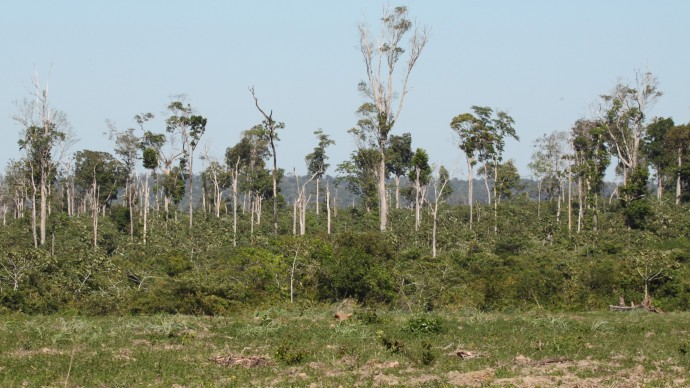
Research: Biodiversity and climate in tropical forests
Large-scale research across tropical forests in Asia, Africa and South America have informed legislation and investment for their protection.
Summary
Research summary
Manchester Met conducts research across the tropics that explores how land use and climate change affect biodiversity and ecosystem services. Our work also considers the tricky trade-offs between environmental conservation and economic development.
Dr Alexander Lees is on the steering committee of the Sustainable Amazon Network (RAS), a multinational collective of 30 institutions involved in Amazonian ecological research. He collected data for the largest assessment of bird species responses to habitat alteration in Amazonia.
The study found that changes in forest structure and land-use disrupt seed dispersal and insect predation by forest birds in ways that mean the forest may never recover, even with effective protection in place. Dr Lees and collaborators also found that managing forests primary for their capacity to store carbon may not protect biodiversity, leading to the team to recommend that large-scale reforestation plans needed to meet joint biodiversity and carbon storage goals.
These findings were supported by a pan-tropical study led by Dr Martin Sullivan who found that tree biodiversity and carbon stocks were decoupled in intact primary forests.
Dr Sullivan works equitably with African and Amazonian forest research networks to assess how tropical forests respond to changes in the climate. His research has discovered a worrying situation: although tropical forests currently absorb more carbon than they emit (acting as a carbon sink), the strength of this sink is weakening, especially in South America.
African tropical forests appear to be more resilient as carbon sinks due to their cooler climate and the long lifespans of their trees.

The Silent Forest
Floresta Silenciosa - The Silent Forest - features long-form narratives of forest degradation underpinned by Alexander Lees’ research.Research impact
The research of Dr Lees and the SAN directly influenced commitments by the State of Pará, Brazil to increase secondary reforest cover to 5,650,000ha by 2030 to help reach net zero climate targets. This area is almost half of the target for all of Brazil under its Nationally Determined Contributions from the Paris agreement of the UNFCCC. An official state decree enshrines the commitment in state law, which uses the research to calculate rates of forest carbon accumulation.
Dr Sullivan’s work has been incorporated into the 2019 refinement of the IPCC’s biomass defaults, providing more up to date information about variation in carbon stocks and carbon uptake for use in carbon accounting. Research by the AfriTRON network has helped quantify the value and climate resilience of tropical forests in the Congo Basin; this evidence base allowed Gabon to secure $17m funding for forest protection from Norway. The payment is the first instalment in an agreement to provide $150m for reducing emissions from deforestation and land degradation over ten years.
Delivering sustainable development

Climate action

Life on land

Partnership for the goals
Research outputs
Academic papers
- Ferreira, J, Lennox, GD, Gardner, TA, Thomson, JR, Berenguer, E and Lees, AC et al (2018) Carbon-focused conservation may fail to protect the most biodiverse tropical forests. Nature Climate Change 8(8):744-749
- Lennox, G.D., Gardner, T.A., Thomson, J.R., Ferreira, J., Berenguer, E., Lees, et al. 2018. Second rate or a second chance? Assessing biomass and biodiversity recovery in regenerating Amazonian forests. Global Change Biology, 24(12), pp.5680-5694
- Bregman, TP, Lees, AC, MacGregor, HE, Darski, B, de Moura, NG, Aleixo, A, Barlow, J and Tobias, JA (2016) Using avian functional traits to assess the impact of land-cover change on ecosystem processes linked to resilience in tropical forests Proceedings of the Royal Society B: Biological Sciences, 283(1844), p.20161289.
- Bennet, A, Dargie, G, Cuni-Sanchez, A, Mukendi, J, Hubau, W, Mukinzi, J, Phillips, O, Malhi, Y, Sullivan, MJP et al (2021) Resistance of African tropical forests to an extreme climate anomaly Proceedings of the National Academy of Sciences, 118, e2003169118
- Cuni-Sanchez, A and Sullivan, MJP et al (2021) High aboveground carbon stock of African tropical montane forests. Nature, 596, 536-542
- Sullivan, MJP et al (2020) Long-term thermal sensitivity of Earth’s tropical forests. Science 368, 869-874
- Requena Suarez, D and Sullivan, MJP et al (2019) Estimating aboveground net biomass change for tropical and subtropical forests: Refinement of IPCC default rates using forest plot data. Global Change Biology, 25, 3609-3624.
Report
- Science Panel for the Amazon, including contributions from Dr Alex Lees (2021) Amazon Assessment Report 2021
Team
Contact
Contact us
For general enquiries, please contact Environmental Change research group leads Dr Elias Symeonakis and Dr Martin Sullivan.
